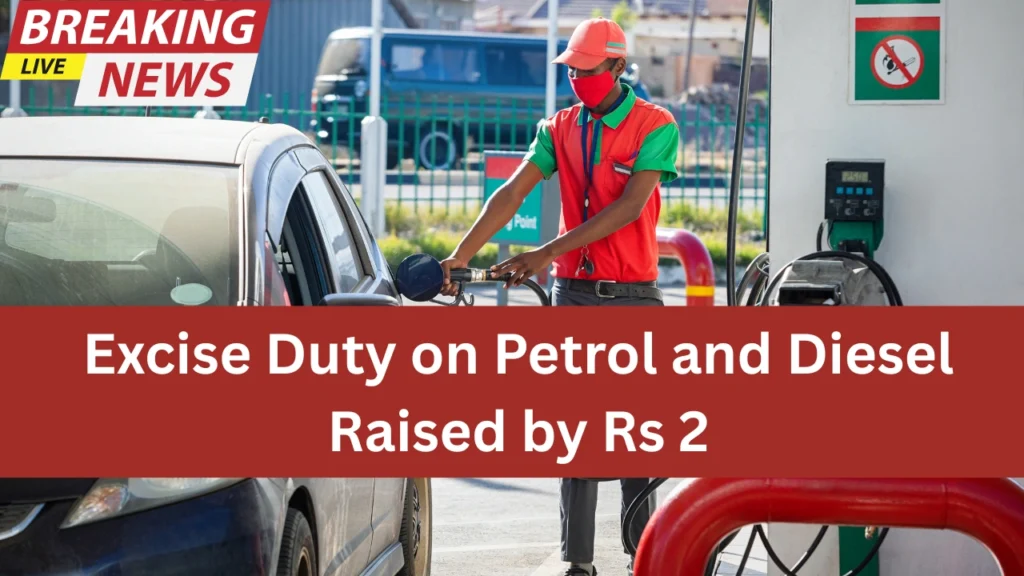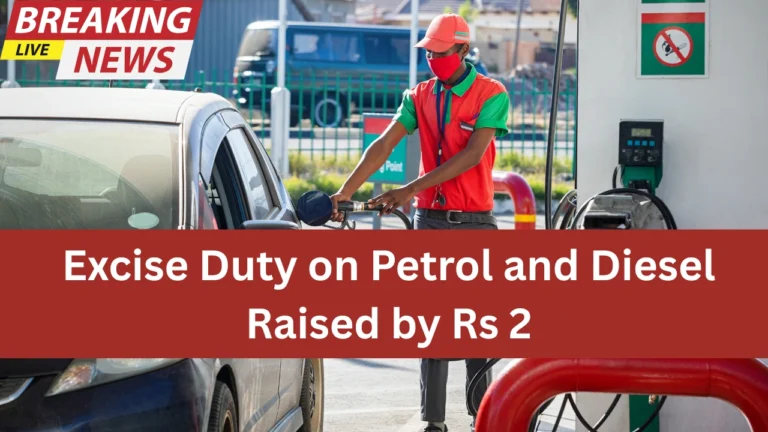In a move that has caught the attention of many across the country, the Indian government has decided to raise excise duty on petrol and diesel by Rs 2 per litre. While the global crude oil prices are currently on a downward trend, driven by concerns over a potential global trade war triggered by tariffs from the US administration, this price hike in excise duty comes at a time when Indian consumers are already feeling the pinch of inflation.

Despite global oil prices declining, this increase in excise duty raises questions about the impact it will have on the cost of living in India and whether it will affect consumer behavior and economic stability. In this article, we’ll delve into the reasons behind the excise duty hike, how it affects Indian consumers, and what the future holds.
Govt Increases Excise Duty by ₹2 per Litre on Petrol and Diesel
— Marketing Maverick (@MarketingMvrick) April 7, 2025
The excise duty hike will not affect petrol and diesel prices at the pump, as it will be absorbed by oil marketing companies. pic.twitter.com/QoVPKDHBV7
Government’s Rationale Behind the Excise Duty Hike
As per a recent notification from the Finance Ministry, the Rs 2 per litre excise duty hike on petrol and diesel will come into effect on April 8, 2025. The government’s primary motivation for this decision seems to be boosting revenue, especially in a time when the country is trying to balance its fiscal responsibilities. However, this move has sparked concerns, especially since it coincides with rising inflation and global economic uncertainty.
The Petroleum and Natural Gas Ministry has stated that Public Sector Oil Marketing Companies (PSU OMCs) have confirmed that the excise duty increase will not result in an immediate increase in the retail prices of petrol and diesel. According to the Ministry, the retail prices will remain the same despite the hike in excise duty.
This announcement provides some relief to consumers who are worried that the excise duty hike will directly lead to higher fuel costs at the pumps. The Ministry’s statement indicates that the government is keen to avoid placing additional financial strain on consumers, especially given the volatile economic environment.
Impact of the Excise Duty Hike on Indian Consumers
While the government has ensured that there will be no immediate increase in retail fuel prices, it’s important to consider how the Rs 2 per litre excise duty increase may affect Indian consumers in the long run. The increase in excise duty comes at a time when people are already facing the pressure of rising costs of living due to inflation.
Higher fuel prices tend to have a ripple effect on the economy. For instance, transportation costs are a direct consequence of increased fuel prices, which, in turn, affect the cost of commodities, food prices, and daily expenses. The Rs 2 hike might seem small on its own, but its cumulative effect on household budgets could be significant, particularly for low-income families and commuters.
The excise duty hike comes at a time when many consumers are already grappling with high commodity prices and transportation costs. This is especially concerning given that inflation has been a persistent issue in India, with prices of goods and services rising steadily over the past few months.
Global Economic Context: Rising Crude Oil Prices and Trade Wars
The decision to raise excise duty on petrol and diesel seems to be at odds with the current global economic trends. Crude oil prices have been on a downward trajectory, primarily due to global uncertainties, including trade wars sparked by tariffs imposed by the US administration. These tariffs have led to fears of a global economic slowdown, which has negatively affected oil demand and, consequently, oil prices.
Despite falling crude prices, the Indian government has chosen to raise the excise duty, which may raise questions about the long-term economic strategy. However, it’s worth noting that the government has also acted in the past to support the economy by removing the windfall profit tax on locally produced crude and fuel exports in December 2024, in response to falling global oil prices. This was done to cushion the domestic economy from the effects of declining global oil prices.
Government’s Policy on Fuel Taxes
The excise duty hike is part of a broader tax policy that aims to manage the fiscal deficit while also addressing challenges arising from global oil price fluctuations. India is highly dependent on imported oil, and changes in international crude oil prices have a significant impact on the country’s economy.
The government has raised excise duties in the past to shore up revenue, especially when there is a shortfall in tax collections or during times of economic stress. By raising excise duties, the government can generate additional income, which is often used to support infrastructure projects, social welfare programs, and economic reforms.
However, the economic burden of higher fuel prices often falls disproportionately on lower-income groups, who tend to spend a larger share of their income on transportation costs. As fuel prices rise, the costs of everyday goods and services also increase, making it harder for the average household to make ends meet.
What Does the Future Hold for Fuel Prices in India?
Looking ahead, the future of fuel prices in India is uncertain, given the complex interplay of global economic factors and domestic policies. The Indian government has clearly stated that the excise duty hike will not immediately affect retail prices, but the question remains whether this will hold in the long term.
As the global oil market continues to be volatile, fluctuations in crude oil prices could lead to further adjustments in fuel prices, which would ultimately impact consumers. Additionally, the potential for more trade wars and global economic disruptions could continue to affect India’s fuel policies.
It’s important to keep in mind that India’s energy security is a critical issue, and any disruptions in global oil supply chains or oil price volatility could force the government to make further policy adjustments to stabilize fuel prices.
Navigating the Excise Duty Hike
The Rs 2 excise duty hike on petrol and diesel raises important questions about the balance between generating government revenue and protecting consumers from inflationary pressures. While the government has stated that the excise duty hike will not lead to an immediate increase in fuel prices, the long-term effects on consumers cannot be ignored.
As the government looks to stabilize the economy and manage fiscal challenges, it will need to carefully consider the impact of these tax hikes on household budgets and consumer spending. The recent decision highlights the ongoing challenges faced by consumers in an increasingly complex economic environment, and it will be interesting to see how the situation evolves in the coming months.
Key Takeaways
- Rs 2 excise duty hike on petrol and diesel comes at a time of global economic uncertainty.
- Retail fuel prices will not change immediately, according to the Petroleum Ministry.
- The excise duty increase could have a ripple effect on transportation costs and commodity prices.
- Government revenue generation and fiscal stability remain key priorities for the Indian government.
- Consumers will need to monitor fuel prices and government policies to gauge long-term effects.

